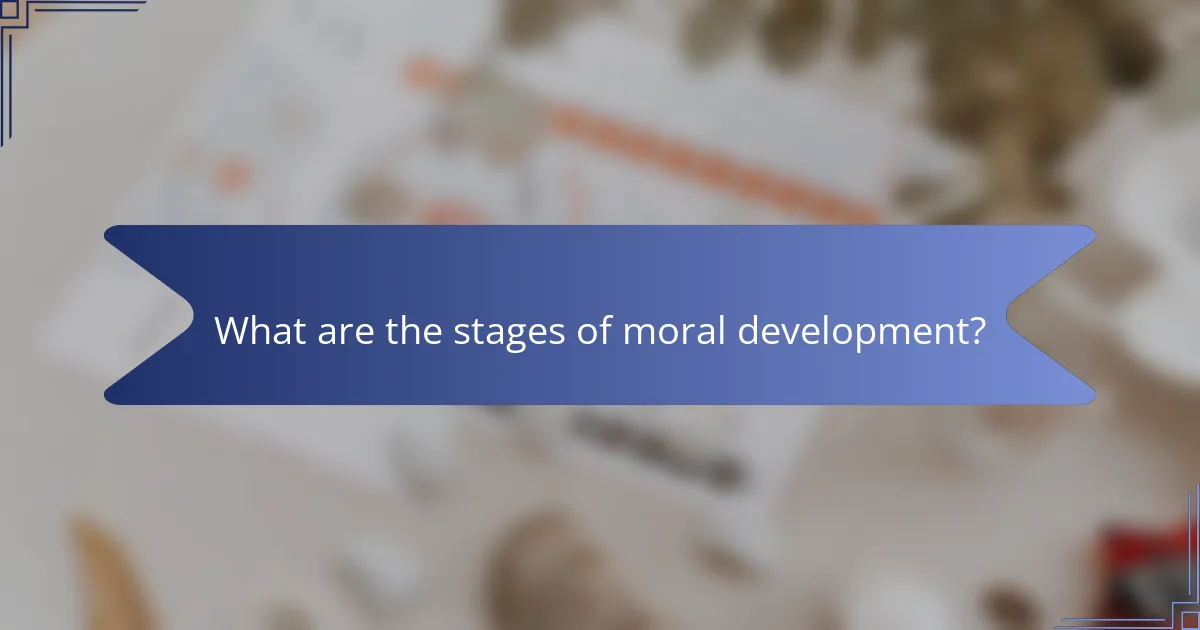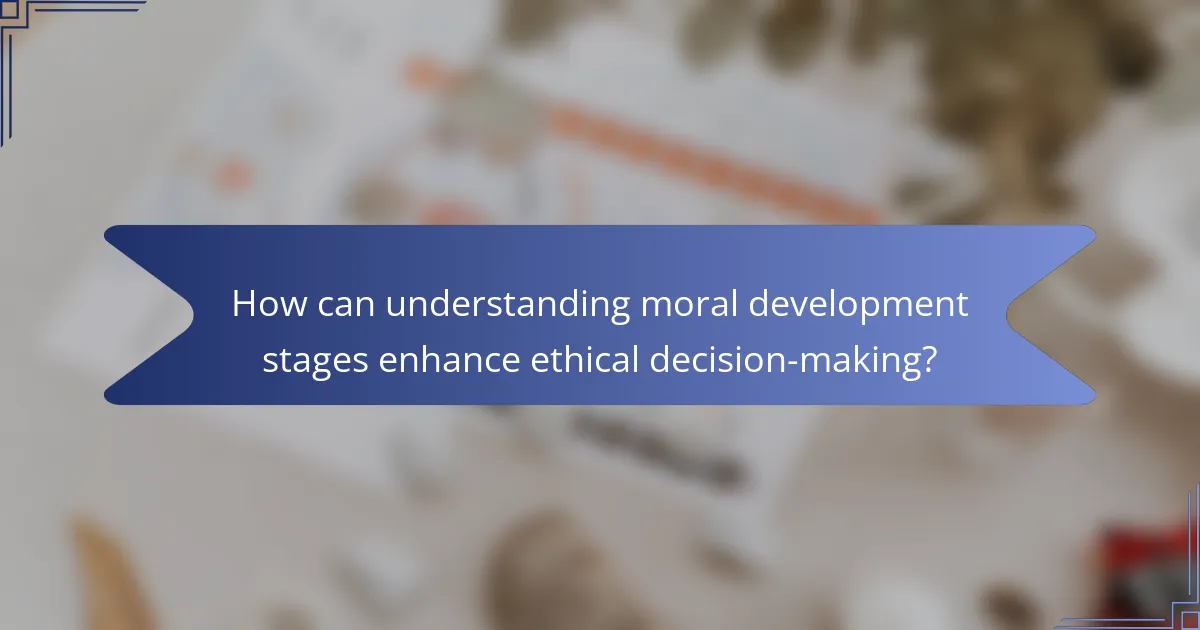Understanding moral development stages is essential for effective ethical decision-making and personal growth. This article explores the three key stages: pre-conventional, where morality is based on consequences; conventional, defined by societal norms; and post-conventional, which involves abstract reasoning and universal principles. By examining these stages, readers can better evaluate their moral reasoning and enhance their ability to navigate complex ethical dilemmas. Insights from Kohlberg’s theories provide a framework for recognizing values and fostering empathy in decision-making.

What are the stages of moral development?
Moral development consists of three key stages: pre-conventional, conventional, and post-conventional. Each stage reflects a different approach to moral reasoning and ethical decision-making.
1. Pre-conventional: At this stage, morality is based on individual consequences. Decisions are made to avoid punishment or gain rewards.
2. Conventional: Here, individuals conform to societal norms and expectations. Morality is defined by adherence to rules and laws.
3. Post-conventional: This stage involves abstract reasoning. Individuals recognize universal ethical principles and may challenge societal norms for a higher moral standard.
How do these stages influence personal growth?
Moral development stages significantly influence personal growth by shaping ethical reasoning and decision-making. Each stage offers unique insights into moral dilemmas, fostering critical thinking and empathy. As individuals progress through these stages, they develop a deeper understanding of themselves and others, enhancing their ability to navigate complex social situations. This growth is essential for cultivating strong moral values and responsible citizenship.
What key theories explain moral development?
Key theories explaining moral development include Kohlberg’s stages of moral reasoning, Gilligan’s ethics of care, and Bandura’s social learning theory. Kohlberg identifies three main levels: pre-conventional, conventional, and post-conventional, each with two stages reflecting increasing complexity in moral reasoning. Gilligan emphasizes the importance of relationships and empathy, suggesting that moral development can differ based on gender perspectives. Bandura highlights the role of observational learning in shaping moral behavior, illustrating how individuals adopt moral standards through social interactions. These theories collectively enhance understanding of ethical decision-making and personal growth.
What is Kohlberg’s theory of moral development?
Kohlberg’s theory of moral development outlines six stages divided into three levels: pre-conventional, conventional, and post-conventional. Each stage represents a different approach to moral reasoning and ethical decision-making.
The pre-conventional level focuses on obedience and self-interest. The conventional level emphasizes social norms and maintaining relationships. The post-conventional level prioritizes universal ethical principles and individual rights.
Kohlberg’s framework highlights how moral reasoning evolves with cognitive development. This progression allows individuals to navigate complex ethical dilemmas more effectively. Understanding these stages aids personal growth and enhances decision-making skills.
How does Gilligan’s theory differ from Kohlberg’s?
Gilligan’s theory emphasizes care and relationships, while Kohlberg’s focuses on justice and moral reasoning. Gilligan critiques Kohlberg for lacking a female perspective, arguing that moral development includes empathy and connection. Kohlberg outlines six stages of moral reasoning, whereas Gilligan proposes a different framework centered on ethics of care. This distinction highlights how gender influences moral perspectives and decision-making processes.
What are the universal attributes of moral development stages?
Moral development stages universally include the progression through distinct phases characterized by evolving ethical reasoning. These stages are often defined by attributes such as cognitive development, social interaction, and moral reasoning.
Key attributes of moral development stages are:
1. **Cognitive Complexity**: As individuals advance, their ability to understand complex moral dilemmas increases.
2. **Social Influence**: Interactions with peers and authority figures play a critical role in shaping moral understanding.
3. **Emotional Engagement**: Empathy and emotional responses become more pronounced in higher stages.
4. **Moral Reasoning**: Progression reflects a shift from concrete to abstract thinking in moral judgments.
5. **Value Internalization**: Individuals begin to internalize societal values and norms as they mature.
These attributes collectively illustrate the dynamic process of moral development, highlighting how ethical decision-making evolves over time.
How do moral reasoning and ethical decision-making intersect?
Moral reasoning and ethical decision-making are interconnected processes that guide individuals in evaluating right from wrong. Moral development stages, such as those proposed by Kohlberg, illustrate how reasoning evolves through levels of complexity, impacting ethical choices.
As individuals progress through these stages, they move from basic obedience to higher principles, influencing their decision-making framework. For example, those at advanced stages prioritize universal ethical principles over societal norms. This evolution highlights how moral reasoning shapes the capacity for ethical decision-making.
In summary, moral reasoning provides the cognitive framework, while ethical decision-making applies these principles in real-world scenarios, demonstrating their intersection in personal growth and ethical behavior.
What role does empathy play in moral development?
Empathy plays a crucial role in moral development by enhancing understanding and compassion for others. It fosters ethical decision-making and personal growth through emotional connection. Empathy enables individuals to recognize the feelings and perspectives of others, which is essential in navigating moral dilemmas. This emotional insight contributes to the development of moral reasoning, allowing for better judgments about right and wrong. As a result, empathy not only shapes personal values but also influences social interactions and community engagement, reinforcing the importance of ethical behavior in society.
What unique attributes characterize moral development theories?
Moral development theories are characterized by unique attributes such as stages of moral reasoning, the influence of social interactions, and the role of cognitive development. These theories emphasize the progression from simplistic to complex moral reasoning, illustrating how individuals navigate ethical dilemmas over time. Key theorists like Lawrence Kohlberg and Carol Gilligan highlight different perspectives, with Kohlberg focusing on justice and Gilligan emphasizing care. The integration of these attributes fosters a deeper understanding of moral growth and ethical decision-making processes.
How do cultural factors influence moral development?
Cultural factors significantly shape moral development by influencing values and ethical perspectives. These factors include traditions, family beliefs, and societal norms that dictate acceptable behavior. For example, collectivist cultures often emphasize community and familial loyalty, impacting individual moral reasoning. As a result, moral development stages may vary widely across cultures, reflecting unique ethical frameworks. Understanding these influences is crucial for personal growth and ethical decision-making, as they provide context for diverse moral viewpoints.
What is the impact of education on moral reasoning?
Education significantly enhances moral reasoning by fostering critical thinking and ethical understanding. Research indicates that individuals with higher education levels demonstrate more advanced moral reasoning, as they engage with diverse perspectives and complex ethical dilemmas. This exposure cultivates empathy and the ability to analyze moral issues deeply. Unique attributes of education, such as curriculum diversity and experiential learning, contribute to this growth. As a result, educated individuals are better equipped to make ethical decisions in personal and professional contexts.
What rare attributes can be observed in moral development?
Rare attributes in moral development include the influence of culture on ethical reasoning, the impact of empathy on moral choices, and the role of cognitive dissonance in moral growth. These attributes highlight how individual experiences and societal norms shape moral understanding. Additionally, the development of moral identity can vary significantly among individuals, reflecting unique personal values and beliefs.
How does age affect moral reasoning capabilities?
Age significantly impacts moral reasoning capabilities, with younger individuals often relying on concrete rules and older individuals demonstrating more nuanced and abstract thinking. Research indicates that as people mature, they transition through various moral development stages, influenced by cognitive growth and social experiences. For instance, adolescents may focus on peer acceptance, while adults often consider broader societal implications. This evolution enhances ethical decision-making, allowing for a deeper understanding of moral dilemmas.
What uncommon ethical dilemmas challenge moral development?
Uncommon ethical dilemmas that challenge moral development often involve complex situations where traditional moral frameworks clash. Examples include conflicts between loyalty and justice, or the implications of technology on privacy. These dilemmas require individuals to navigate competing values and make decisions that may not align with their personal beliefs or societal norms. Engaging with these challenges can foster deeper ethical reasoning and personal growth.

How can understanding moral development stages enhance ethical decision-making?
Understanding moral development stages enhances ethical decision-making by providing a framework for recognizing and evaluating moral dilemmas. This framework helps individuals identify their current stage of moral reasoning and understand the implications of their choices. By applying theories such as Kohlberg’s stages of moral development, individuals can gain insights into their values and those of others, promoting empathy and informed decision-making. This understanding can lead to more consistent and principled choices, fostering personal growth and ethical behavior in complex situations.
What best practices can be applied for personal growth?
To foster personal growth, apply best practices rooted in moral development theories. Focus on self-reflection, ethical reasoning, and empathy. Engage in continuous learning to enhance decision-making skills. Seek feedback to identify areas for improvement and cultivate resilience through challenges. Establish clear values to guide actions and choices.
What common mistakes should be avoided in moral reasoning?
Common mistakes in moral reasoning include oversimplifying complex issues, ignoring diverse perspectives, and relying on emotions over facts. Additionally, failing to consider long-term consequences can lead to poor ethical decisions. Recognizing these pitfalls enhances moral development and decision-making.
What expert insights can enhance understanding of moral development?
Expert insights into moral development emphasize the importance of understanding key theories that guide personal growth and ethical decision-making. Notable frameworks include Kohlberg’s stages of moral development, which outline how individuals progress through distinct levels of moral reasoning. These stages range from obedience to authority to the development of universal ethical principles.
Research indicates that moral development is influenced by social interactions and experiences, highlighting the role of empathy and moral reasoning in ethical behavior. Engaging in discussions about moral dilemmas can enhance understanding and foster critical thinking. Additionally, integrating diverse perspectives can enrich one’s moral framework, promoting a more comprehensive approach to ethical decision-making.
Recognizing the unique attributes of moral development, such as the impact of culture and upbringing, can further deepen insights. These factors shape how individuals perceive and engage with moral issues, ultimately influencing their personal growth and ethical choices.